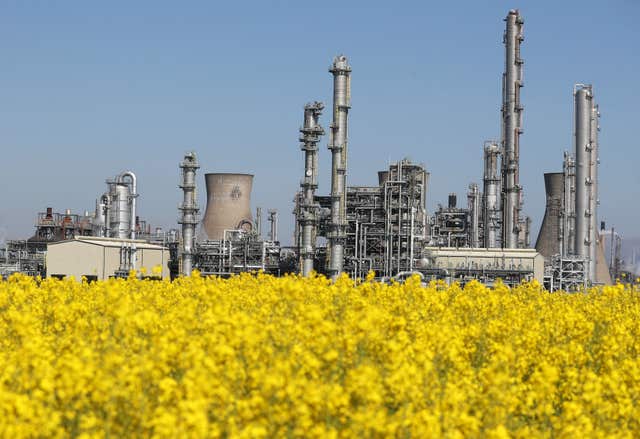
The Scottish Government’s fracking ban is facing a legal challenge from petrochemical giant Ineos.
The Grangemouth owner said it would seek a judicial review of the “unlawful” ban, arguing there were “very serious errors” in the decision-making process.
A moratorium on the controversial gas extraction technique had been in place in Scotland since 2015 and in October last year energy minister Paul Wheelhouse announced that planning regulations would be used to ”effectively ban” it by extending the moratorium ”indefinitely”.
At the time, he said 99% of respondents to a public consultation backed the ban and government-commissioned research ”does not provide a strong enough basis from which to address these communities’ concerns”.
INEOS Challenges Scottish Government's ban. https://t.co/nBaIOFV1hP
— INEOS Shale (@INEOS_Shale) January 9, 2018
Tom Pickering, operations director at Ineos Shale, said: “The decision in October was a major blow to Scottish science and its engineering industry, as well as being financially costly to Ineos, other businesses and, indeed, the nation as a whole.
“We have serious concerns about the legitimacy of the ban and have therefore applied to the court to ask that it review the competency of the decision to introduce it.”
Ineos Shale has lodged a petition for judicial review alongside co-venture partner Reach at the Court of Session, Scotland’s highest civil court, arguing there was a “failure to adhere to proper statutory process and a misuse of ministerial power”.
The company said the ban on unconventional oil and gas extraction would result in Scotland missing out on economic benefits, including about 3,100 Scottish jobs and £1 billion for local communities.

Ineos Shale said millions that had been invested in acquiring licences and obtaining planning permission for drilling sites had been “rendered worthless” by the ban.
“This despite the panel of scientific experts appointed by the Scottish Government concluding that shale development is capable of being managed safely,” the company said.
Mr Pickering added: “Natural gas keeps the power on and homes warm in Scotland as with the rest of the UK, and shale has the potential not only to meet these needs but also to have a positive impact on the economy and energy security.
“Ineos, Reach and other operators have invested significantly in unconventional development over the years, against a supportive regulatory and planning backdrop.
“If Scotland wants to continue to be considered as a serious place to do business, then it cannot simply remove the policy support that attracted that investment in the first place without proper procedures being followed and without the offer of appropriate financial compensation.
“In the light of these failings, Ineos has been left with no option other than to raise this legal challenge.”
⛔ Ineos’s decision to challenge Scotland’s #fracking ban has been called predictable and desperate by @markruskell
"This isn’t the first time that big business has thrown its toys out of the pram when they don’t get their own way."https://t.co/vXblWTJfRh pic.twitter.com/PAWrZV5QIX
— Scottish Greens (@scotgp) January 9, 2018
Green MSP Mark Ruskell said: “This is a predictable and desperate attempt by an industry sinking under public protest in England to try and salvage the last drop of commercial benefit in Scotland.
“Scotland doesn’t want or need fracking and Ineos should accept they lost the democratic debate in the Scottish Parliament, the evidence was there to ban fracking and that is what Holyrood has done.”
Friends of the Earth Scotland also said the move “reeks of desperation” and it was confident the courts would find against Ineos.
But Tory MSP Murdo Fraser said: “The SNP’s decision to ban fracking is rooted in dogma, and ignores the economic benefits it could bring to Scotland.
“Further exploration of shale extraction could also reduce the need for gas imports, and even help relieve fuel poverty.
Ineos legal challenge to Scottish #fracking ban 'reeks of desperation' #NotHereNotAnywhere https://t.co/vKPV2JlX4j
— FoE Scotland (@FoEScot) January 9, 2018
“The Scottish Government’s own advisers know this, yet still ministers are sticking to this needless and potentially damaging ban.
“This is another day in court for an SNP Government which doesn’t think its policies through.”
Mr Wheelhouse said: “We have taken a careful and considered approach to arriving at our preferred policy on unconventional oil and gas in Scotland.
“The Scottish Government’s position was endorsed by the Scottish Parliament in October, subject to completion of a strategic environmental assessment, and follows detailed assessment of the evidence and consultation with the public.”


Comments: Our rules
We want our comments to be a lively and valuable part of our community - a place where readers can debate and engage with the most important local issues. The ability to comment on our stories is a privilege, not a right, however, and that privilege may be withdrawn if it is abused or misused.
Please report any comments that break our rules.
Read the rules hereLast Updated:
Report this comment Cancel